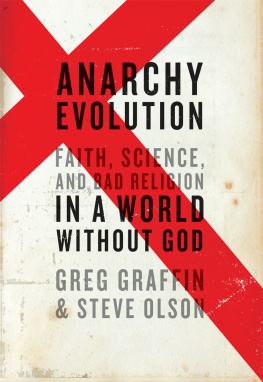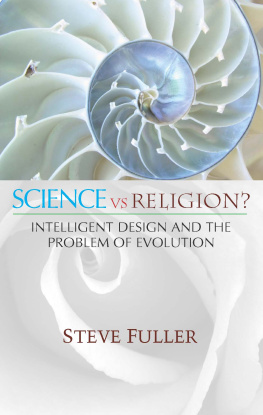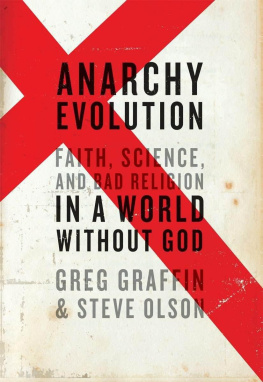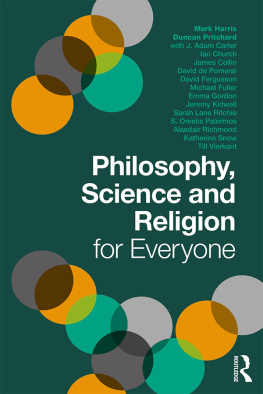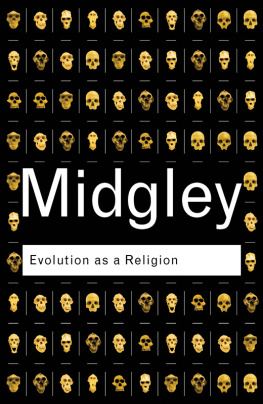THE PROBLEM WITH AUTHORITY
Sire, I have no need of that hypothesis.
Pierre-Simon Laplace 1
To punish me for my contempt for authority, fate made me an authority myself.
Albert Einstein 2
I ve always had a problem with authority. When I was in the third grade at Lake Bluff Elementary School just outside Milwaukee, my teacher, Wanda Rood, knew that I hated to be called by my full name, Gregory. I have always been Greg to my family and friends, and whenever Miss Rood called me Gregory to humiliate or intimidate me, I burned with anger. Finally, one day when I was talking too much to my friends, Miss Rood said, Gregory, do you have something to say to us all? I replied, Dont call me Gregory, Wanda.
When my mother heard what Id done, she laughed. That mouth of yours is going to get you in trouble, she said. And I did get in trouble, especially after she got back from meeting with the principal. But my mom rarely condemned me or my brother for the rebellious things we did when we were kids. Maybe she figured that suppressing the bad would get rid of the good, too.
All of us are bombarded every day by people telling us what we should do and how we should think. Politicians try to persuade us that they have the answers to the worlds problems if only we will enlist in their cause. Ministers, priests, and imams tell us that we must lead a life in accord with ancient decrees or face the consequences in the afterlife. We are constantly exposed to subtle or not-so-subtle messages about how we should behavein advertisements, movies, radio and television talk shows, even music and books.
Even more alarming than the number of these injunctions is their frequent intolerance. All my life I have been subjected to the dogmatic, fundamentalist attitudes of authority figures. Maybe I have a congenital distaste for authority, but I feel that I grew up surrounded by fundamentalismsand today those fundamentalisms seem to be getting even stronger. My family has a history of religious evangelism, but at least my elderly relatives were respectful of others right to independent thought. Today I cant open a newspaper without reading about religious fanatics detonating bombs that they have strapped to their bodies or harassing abortion providers to the point of death. Political parties demand litmus tests of their members to make sure they will not stray from highly partisan edicts. Even in the fields where I have chosen to spend the majority of my lifemusic and scienceIve often encountered authorities who rarely stray from worn-out dogma and overbearing expectations for allegiance.3
There are two possible ways of responding to these demands. One is to acquiesce, whether wholeheartedly or with reservations. Many of my friends are religious, and theyve given me many explanations for their beliefs. Because I want to go to heaven and live forever, they might say. Or because I want to avoid sin, others respond, or because I want to live the good life exemplified by the martyrs. These answers are similar to those my nonreligious friends give me when I ask them why they bow to the demands of authority. Because I dont want to make waves, or life is easier if we avoid controversy, or I dont really have my own philosophy, so I might as well try someone elses. People have many ways of justifying their behaviors to themselves and to others.
The other option is to resist authority, whether quietly or defiantly. When Bad Religion released its third album, Suffer, in 1988, the album cover showed a teenage boy standing in a bland suburban neighborhood consumed by flames. (The image occurred to me and my friend Jerry, who painted it, while we were working as salad-bar hosts at an L.A. restaurant.) That image seemed to capture the simultaneous anger, powerlessness, and defiance of my teenage years, emotions that fueled my songwriting and performances in the early days of the band. And that image seems also to have resonated with many Bad Religion fans, because Ive seen hundreds of torsos and arms emblazoned with suffer boy tattoos.
But there is a big problem with resisting authority. If you cant rely on it, what can you rely on? Many people feel very uncomfortable giving up the certainties on which they have based their lives. They think that without a bedrock of belief, their lives will have no purpose or meaning. Many religious people, for example, believe that without religion there can be no morality. They fear that humans might use their free will to do terrible thingssteal, rape, murderif they did not believe in a caring God constantly watching over and keeping them on the path of righteous ness.
For those of us who see no need for supernatural entities, this is a highly offensive belief. It condemns our lives as deviant and amoral. It also has no empirical proof. The countries that are least religious tend to have the most law-abiding and generous citizens.4 It doesnt even make sense, as philosophers since the time of Socrates have pointed out.5 Either harming other people is wrong, in which case God is unnecessary, or harming other people is acceptable, in which case Gods admonitions are misguided.
Some people have a more basic fear. Ive had friends who think that if they question their beliefs in God or spirituality or some higher purpose, they will begin a long, lonely descent toward nihilistic anarchy in their lives. They fear that they will see themselves as no more than soulless animals, biological mechanisms, bits of a temporary consciousness that will soon be gone forever.
This fear is not entirely misplaced. The natural world and the evolutionary processes that produced us are anarchic. There is no ultimate reason for our existence. We were born to parents who loved us, if we were fortunate, and who wanted us to do well in life. But we were not placed on this earth for some divine purpose that only communion with the spirit world can reveal.
However, people make a big mistake if they conclude from the anarchy of the physical world that life has no meaning. I draw just the opposite conclusion. The purposelessness of the natural world emphasizes the tremendous meaning inherent in the human world.
It took me a long time to figure out and be able to describe what I rely on in place of authority. I had to experiment with different ideas. I had to get into the world to see which ideas worked and which ideas did not. What worked for me may not work for someone else. Yet I have discovered some things in my quest for meaning that I think other people might want to know.
I have had the great privilege of living my life at the intersection of art and scienceor, more specifically, at the intersection of evolutionary biology and punk rock. These two fields may not seem to have much in common. When I am teaching biology at UCLA, most of the students do not know that Im the singer for Bad Religion, though occasionally I see someone with a laptop who is obviously watching one of my shows. And when I am singing on stage, few people know or care about the work Ive done in evolutionary biology. But I have found that the two have an underlying connectiona celebration of the creativity inherent in lifethat makes the combination less exotic.
Many religious people say that all creation comes originally from God, but I have never believed in God. My parents never pushed the idea on me, and I never saw any reason to adopt it. I have never seen any evidence in anything I have done that any kind of force outside nature acts to influence the physical or biological world. If such evidence could be shown to exist, I would have to consider changing my position. But I do not think any such evidence will be found, and most religious believers do not expect or even necessarily desire such evidence to be found. For me, the existence or nonexistence of God is a nonissue.

